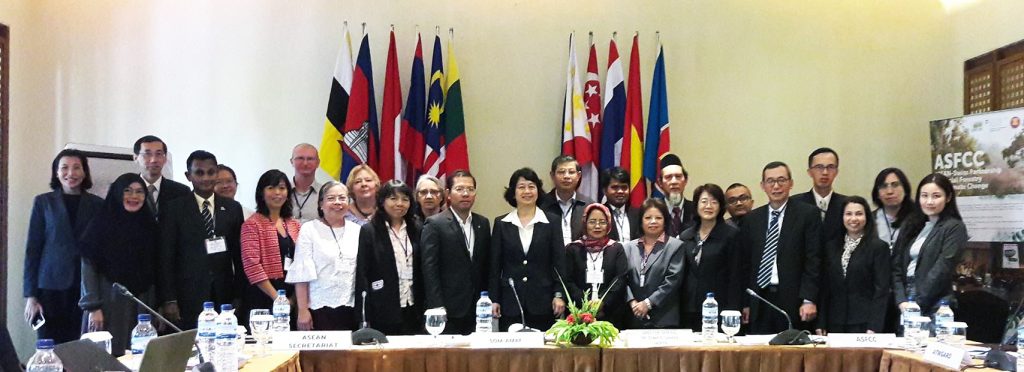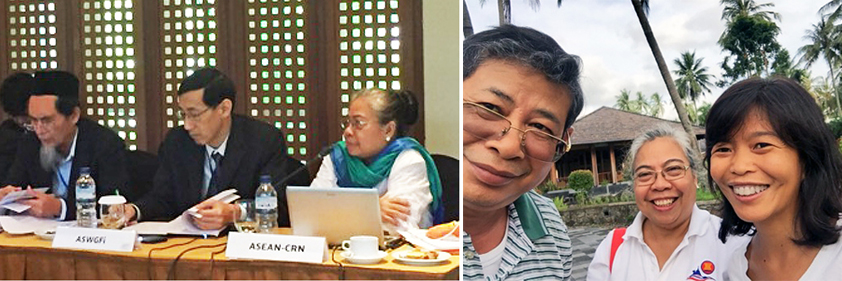
LOMBOK, Indonesia – The ASEAN Climate Resilience Network (ASEAN-CRN) has participated in the 6th Steering Committee on Climate Change and Food Security (6th AHSC-CCFS) Meeting, held from 18-19 January 2018 in Lombok, Indonesia.
The meeting convened the Chairs and representatives of relevant ASEAN working groups on climate change, namely: Senior Officials Meeting (SOM-AMAF), ASEAN Sectoral Working Group on Crops (ASWGC), ASEAN Technical Working Group on Agriculture Research and Development (ATWGARD) and ASEAN-CRN under its purview, ASEAN Working Group on Social Forestry (AWG-SF), ASEAN Working Group on Forest and Climate Change (AWG-FCC), ASEAN Senior Officials on Forestry (ASOF), ASEAN Sectoral Working Group on. Livestock (ASWGL), ASEAN Sectoral Working Group on Fisheries (ASWGFi), Senior Officials Meeting on Rural Development and Poverty Eradication (SOM-RDPE), ASEAN Senior. Officials on Environment (ASOEN), and ASEAN Sectoral Working Group on Climate Change (ASWGCC).
With support from the ASEAN-Swiss Partnership on Social Forestry and Climate Change (ASFCC), the meeting aimed to discuss the draft multi-sectoral conceptual framework for climate change and food security, develop the ASEAN Guidelines for integrating the gender dimension and marginalized groups to reduce their vulnerability to natural disasters and climate change, as well tackle various initiatives being addressed by respective working groups on climate change.
- On the multi-sectoral conceptual framework for climate change and food security
The framework consists of three core elements namely: 1) a set of proposed approaches based on proven and promising strategies that address climate change-related issues and in the food, agriculture, and forestry (FAF) sectors; 2) dimensions of food security that are expected to be enhanced by the proposed approaches; and 3), the Sustainable Development Goals (SDGs) to which both the approaches and the achievement of food security and its dimensions are expected to contribute. The seven proposed approaches include: 1) strengthening scientific foundation, 2) mainstreaming climate change, 3) achievement of nationally determined contributions (NDCs), 4) integrating climate change responses through landscape approach, 5) capacity building, 6) knowledge management, and 7) climate financing. It was emphasized that there is a need to identify the mechanism of the ASEAN Multi-Sectoral Framework on Climate Change: Agriculture and Forestry towards Food Security (AFCC) to provide guidance on cross-sectoral collaboration and reporting among various sectors. Furthermore, in improving the framework, relevant international policy frameworks such as the Paris Agreement should be utilized as reference.
- On ASEAN Guidelines on Integrating Gender Dimension and Marginalized Group in FAF Sectors
One of the key deliverables for FAF in 2018, the guideline aims to promote gender equity in agriculture and climate change and provide understanding to address gender issues in FAF sectors. The framework for mainstreaming gender will provide measures related to policy and advocacy, capacity building, institutional framework, partnerships, communication and information and research, innovation and technology. Development partners GIZ Forestry and Climate Change (FOR-CC) project and The Center for People and Forests (RECOFTC) will assist in shaping the guideline.
A successful multi-stakeholder knowledge platform in promoting climate smart agriculture practices in the region and in international negotiations, ASEAN-CRN shared its experiences and lessons learned in promoting CSA practices in the hope that it could contribute to the enhanced action of ASEAN in jointly mitigating and adapting to the changing climate, subsequently safeguarding food security throughout the region.

ASEAN-CRN is established to ensure that ASEAN Member States are in a better position to adapt their agricultural sector to climate change and optimize its mitigation potential. The network promotes climate resiliency through exchange of information, expertise, and experiences on Climate Smart Agriculture practices amongst ASEAN member states. The ASEAN-CRN is supported by the German Federal Ministry for Economic Cooperation and Development (BMZ) through the FOR-CC project under the ASEAN-German Programme on Response to Climate Change in Agriculture and Forestry (GAP-CC) and implemented by the Deutsche Gesellschaft für Internationale Zusammenarbeit (GIZ) GmbH in close cooperation with the ASEAN Secretariat (ASEC).
ASFCC is a program funded by the Swiss Agency for Development and Cooperation (SDC) to support the AWG-SF in addressing three interrelated issues confronting the region – food insecurity, poverty, and climate change.
By: Kristine Joy S. Villagracia